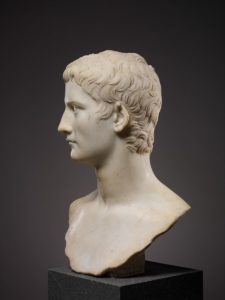
Because the book Neo-Christianity is finally available (even if only in PDF for the moment), I have changed both the sticky post and the featured post. In both I used the symbol from George R.R. Martin’s fantasy novels about the Weirwood tree (a tree that, if a greenseer touches it, he can paranormally see into the past of Westeros). I would like to exemplify what I meant in the sticky and the featured posts with a new series on the figure of Emperor Caligula. As can be read on pages 16-17 of Neo-Christianity:
The Roman procurator Pontius Pilate, who governed Palestine from 26 to 36 AD, was known for his aggressive treatment of the Jews. But things grew even worse for them after his removal from power and the ascension of Emperor Caligula in Rome. Hayim Ben-Sasson writes, “The reign of Caligula (37-41 AD) witnessed the first open break between the Jews and the Empire… Relations deteriorated seriously during this time.”
Years later, Emperor Claudius issued his third edict, Letter to the Alexandrians, in which he accused those Jews of “fomenting a general plague which infests the whole world.” This is a striking passage; it suggests that Jews all over the Middle East had succeeded in stirring up dangerous agitation toward the empire. It also marks the first occurrence in history of a “biological” epithet used against them. By the year 49, Claudius had to undertake yet another expulsion of Jews from Rome.
All this set the stage for the first major Jewish revolt, in the year 66. Also called the First Jewish-Roman War (there were three), this event was a major turning point in history.
This reminds us of what Eduardo Velasco wrote in the essay on Judea vs. Rome, which we translated for The Fair Race, book #2 on the list of thirteen books in the new featured post:
In 41, Caligula, who already promised to be an anti-Jewish emperor, was assassinated in Rome, which unleashed the violence of his German bodyguards who had not been able to prevent his death and who, because of their peculiar sense of fidelity, tried to avenge him by killing many conspirators, senators and even innocent bystanders who had the misfortune to be in the wrong place at the wrong time. Claudius, the uncle of Caligula, would become the master of the situation and, after being appointed emperor by the Praetorian Guard, ordered the execution of the assassins of his nephew, many of whom were political magistrates who wanted to reinstate the Republic.
This is the probable cause of the unprecedented historical defamation of this emperor: the texts of Roman history would eventually fall into the hands of the Christians, who were mostly of Jewish origin and viscerally detested the emperors. Since, according to Orwell, ‘he who controls the past controls the present’ the Christians adulterated Roman historiography, turning the emperors who had opposed them and their Jewish ancestors into disturbed monsters.
Thus, we do not have a single Roman emperor who has participated in harsh Jewish reprisals who has not been defamed by accusations of homosexuality, cruelty or perversion. The Spanish historian José Manuel Roldán has dismantled many of the false accusations against the historical figure of Caligula.
Well, two months ago I received the book in Spanish by José Manuel Roldán Hervás, PhD in classical philology. Already in the prologue of Calígula, el Autócrata Inmaduro (Madrid: La Esfera de los Libros, 2012), Roldán quotes a sentence from Tacitus’ Annals: ‘The deeds of Tiberius and Gaius [Caligula], as well as those of Claudius and Nero, were falsified, out of fear, while they lived; and written, after their deaths, with hatred still fresh’.
In the next entry I will translate the whole prologue to Roldán’s book. For the moment I would just like, as I said, to illustrate what I alluded to in the sticky and featured posts: that the System demoralises the white man through historical lies.
For example, I recently interrupted the Netflix series on Caligula when I saw that they cast him, even before he was emperor, as the poisoner of Tiberius, the previous Roman emperor. One cannot contrast more that tale ‘with hatred still fresh’ with what we read in Roldán’s biography.
If we recall what Catherine Nixey wrote about the burning of entire libraries of the classical world by Christians, it cannot be more unfortunate that of Tacitus’ Annals, originally sixteen books on the reigns of Tiberius, Caligula, Claudius and Nero, the entire reign of Caligula has been lost. Unlike the writers who wrote with hatred, Tacitus is known to have been more objective.
Now back to our metaphor. Unlike Martin’s fiction about the oldest religion of Westeros, its Weirwood trees and the gifted greenseers who saw the past when they touched them, in the real world we have no such window to know, with absolute precision, what happened in the time of those emperors of the first century c.e. But if I still use the metaphor it’s because books like Roldán’s are the closest we have to a truer history of what might have happened.
One reply on “Caligula, 1”
I’ve been watching videos of animal fights (most recently – martens), and imagining the constant squabbles between the Romans and the Jews does feel reminiscent thereof – with the Jews drawing ever closer to death with each wound. It is unfortunate then that the Jewish entrails proved to be poisonous with Christianity, however.
Although it does make me annoyed at how long it took to kill them. Just as Paul can be regarded as an innovator in the field of culture, so too could Hitler be seen as a pioneer in genocide. Something that I will hope history will recognise him for – when she returns, “thunderous and bellicose”.